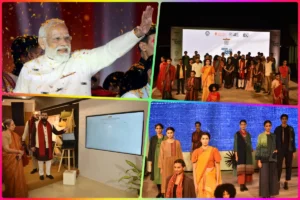
President Droupadi Murmu, in her address at the 75th Constitution Day celebrations on Tuesday, described the Indian Constitution as a “progressive and living document.” She emphasized its continuous relevance and transformative power in shaping the country’s growth over the past 75 years.
The event took place in the Central Hall of Parliament and was attended by Vice President Jagdeep Dhankhar, Lok Sabha Speaker Om Birla, Prime Minister Narendra Modi, Parliamentary Affairs Minister Kiren Rijiju, Leader of Opposition Rahul Gandhi, and members of both Houses of Parliament. In addition to the ceremonial address, leaders launched two books related to the Constitution, marking this significant occasion.
The Constitution As A Pillar Of Progress
In her speech, President Murmu lauded the Constitution as the “most sacred book” of the nation. Reflecting on its historical importance, she said, “Today, we are not just witnesses but partners in this historic event.” She recalled how, 75 years ago, the Constituent Assembly undertook the monumental task of drafting a Constitution for a newly independent India.
Also Read: Prime Minister Modi Pays Tribute To Shashikant Ruia, Essar Group Co-Founder
Paying tribute to Dr. B.R. Ambedkar, the chief architect of the Constitution, President Murmu noted, “Baba Saheb Ambedkar left an indelible mark on our Constitution, making it progressive and all-encompassing.” She also praised the strides India has made in recent years, especially for the welfare of marginalized communities, highlighting government efforts such as providing homes for the poor and developing world-class infrastructure.
The Constitution’s Enduring Impact On Social Justice And Development
President Murmu stressed that the Constitution remains a “living and progressive document,” enabling India to make remarkable progress in social justice and inclusive development. She urged citizens to embody the constitutional ideals in their daily lives, calling on them to fulfill their fundamental duties and work towards the national goal of a “Viksit Bharat” (Developed India) by 2047.
Further emphasizing the importance of unity and cooperation among government branches, President Murmu remarked, “As per the Constitution, it is the duty of the Executive, Legislative, and Judicial branches to work together to improve the lives of ordinary citizens.” She also highlighted landmark reforms, such as the introduction of Goods and Services Tax (GST) and the granting of constitutional status to the National Revenue and Expenditure Act in 2008, as critical steps in advancing India’s economic progress.
Vice President Dhankhar Calls The Constitution A “Masterpiece”
In his address, Vice President Jagdeep Dhankhar described the Indian Constitution as a “masterpiece” reflecting the profound foresight and unwavering dedication of its framers. He praised the Constitution’s architects for their decorum, dedication, and focus on consensus, which shaped the future of the nation.
Dhankhar also addressed the current state of political discourse, saying, “Disturbances in the political discourse threaten our democratic institutions.” He called for a restoration of the sanctity of democratic processes through constructive dialogue and meaningful discussions.
He further emphasized the significance of the Constitution’s opening words, “We the people,” which he described as affirming the citizen as the ultimate authority in India’s democracy. “The Preamble promises justice, liberty, equality, and fraternity to every citizen. It is our guiding star, especially when we face challenges,” Dhankhar stated.
A Call For National Unity And Progress
In conclusion, Vice President Dhankhar urged the nation to prioritize its duties toward sovereignty, unity, national interests, and environmental protection. He reiterated the importance of safeguarding India’s national sovereignty and fostering unity and progress to achieve the vision of a “Viksit Bharat” by 2047, a nation characterized by progress, inclusion, and sustainability.
As India celebrates 75 years of its Constitution, the nation looks ahead to continuing the path of inclusive development and social justice laid out by its founding document.
To read more such news, download Bharat Express news apps





















